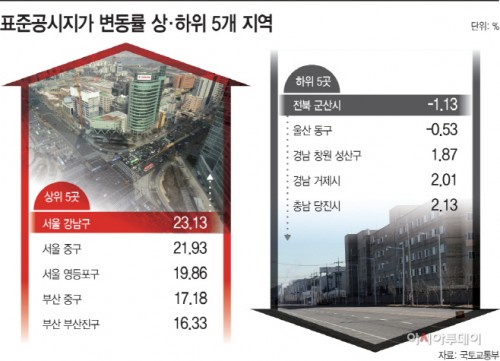 |
By AsiaToday reporter Cheong Ah-reum
The South Korean government hiked appraisal land prices of Seoul by almost 14 percent in 2019 compared to last year. Land in South Korea has gotten more expensive this year, and the pace of the increase was faster in areas already considered expensive or those regions with urban development projects.
The Ministry of Land, Transport and Tourism has revealed Tuesday the average price of this year’s appraisal has increased by 9.42 percent compared to last year.
Breaking it down by major cities and provinces, land prices in Seoul increased the most by 13.87 percent, up 6.98 percent from the previous year. It is the fastest pace in 12 years since 2007, when it recorded 15.43 percent.
It was followed by Gwangju with 10.71 percent rise, Busan with 10.26 percent, Jeju with 9.74 percent, Daegu with 8.55 percent and Sejong with 7.32 percent.
The government significantly raised the appraisal prices of expensive lands worth more than 20 million won (US$17,777) per square meter. The average increase was more than 20 percent.
Hyundai Department Store’s Coex branch located in Samseong-dong, Gangnam district, reported a 32.4 percent rise in appraisal prices. Its estimated market value is 87 million won (US$77,333) per square meter. The appraisal price of the SK Seorin Building, which is located in Seorin-dong, Jongno district, rose 28.9 percent. Its estimated market value is 75 million won (US$66,666) per square meter.
The land ministry explained that it raised appraisal prices of expensive lands and those regions whose recent prices rose sharply as part of the government’s efforts to curb soaring real estate prices and to regulate speculative investment.
According to the government data, lands worth more than 1 million won to less than 10 million won per square meter accounted for 15.1 percent (75,758 plots), lands worth more than 10 million won to less than 20 million won per square meter accounted for 0.5 percent (2,234 plots), and those lands worth more than 20 million won accounted for 0.2 percent (872 plots).
The government will gradually improve the appraisal prices of general lands, which accounts for 99.6 percent.
Land prices in Seoul’s affluent southern Gangnam district surged the most by 23.13 percent among other cities, provinces and districts. The land price hike was largely contributed by its urban development projects, including the establishment of International Exchange Complex Zone and Yeongdong-daero transit terminal.
#appraisal price #land prices #Seoul #South Korea #Ministry of Land
Copyright by Asiatoday
Most Read
-
1
-
2
-
3
-
4
-
5
-
6
-
7





















